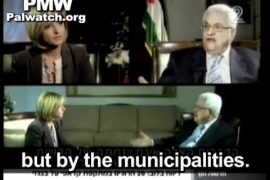1) At WINEP Michael Milstein discusses the scheduled Palestinian elections.
“An unusual convergence of interests between PA president Mahmoud Abbas (Abu Mazen) and Hamas enabled these steps toward elections. On one hand, Abu Mazen is interested in improving his standing with the new administration in Washington and strengthening his legitimacy at home. On the other, Hamas sees an opportunity to improve civilian conditions in Gaza while reinforcing its position in Palestinian politics before a day when Abu Mazen potentially leaves office.
Despite his indications otherwise, Abu Mazen is apparently not genuinely interested in actually bringing about election day. Instead, he still believes he can stop the process at any given moment. Nonetheless, the story of the election is gaining momentum in a way that increases its odds of realization, and as time passes, the step-by-step increase in both internal and international pressures to move forward are making it harder to arrest the process.”
2) MEMRI looks at two presidential decrees recently issued by Mahmoud Abbas.
“Two presidential decrees recently issued by Palestinian Authority (PA) President Mahmoud ‘Abbas aroused intense criticism in the PA. The first, issued on March 2, 2021, imposes severe restrictions on the activity and finances of Palestinian civil society organizations. The second, issued three days later, on March 5, suspends internal elections in all Palestinian professional unions for six months. The civil society organizations fumed over the decrees, which they said were aimed at restricting their independence and preventing them from performing their duty of overseeing the government’s performance. They called them anti-democratic decisions that contravene the Palestinian Basic Law as well as international conventions, and demanded that they be revoked.”
3) Jonathan Spyer asks ‘Who Bombed the Saudi oil facility at Ras Tanoura?’.
“These attacks were the latest episode in a process of escalation currently under way in the region. In it, the Iranians are mobilizing both their own forces and the full range of their proxies, in a campaign of attacks against the US and its allies. The attacks on a US facility at the Erbil airport in northern Iraq on February 15th, the rockets on US personnel at the Balad airbase on February 20th, the placing of limpet mines on the Israeli-owned cargo ship MV Helios Ray in the Gulf of Oman on February 26th, the rockets launched on US facilities at the Ain al-Asad base in Iraq’s Anbar Province on March 3, and the current Houthi offensive on the city of Marib all constitute elements of this offensive campaign.”
4) At the JNS Yaakov Lappin discusses ‘anachronistic laws of war’ with Boaz Ganor.
“The decision by the International Criminal Court (ICC) in The Hague to launch an investigation into Israeli actions warrants an urgent response that should include a push to reform the existing laws of war, a leading counter-terrorism expert told JNS.
Professor Boaz Ganor, founder and executive director of the International Institute for Counter-Terrorism in Herzliya, said, “The response to this dangerous step by the court is to urgently change the anachronistic laws of war and to adjust them to the challenges of war in the face of hybrid terror organizations.” […]
“The problem is not that of Israel, but of the entire enlightened world,” continued Ganor. “The ICC’s decision has created a precedented that will in future prevent every democratic sovereign country from protecting itself against terror organizations that will act to defend themselves against their terrorist enemies.””




